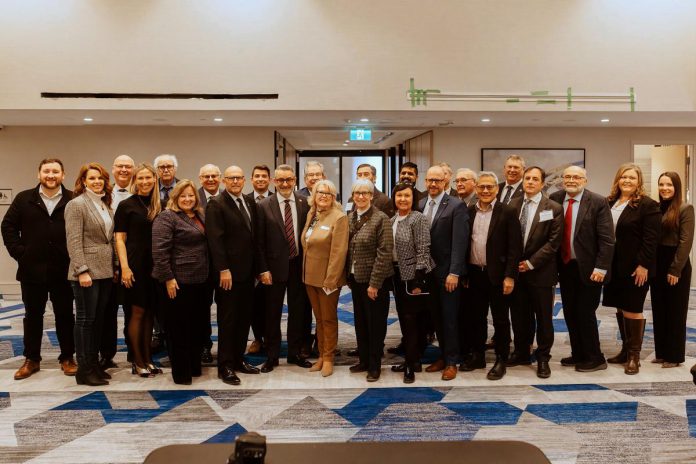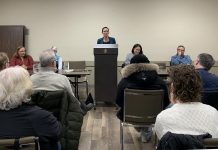
When she considers the upcoming provincial election, Peterborough County warden Bonnie Clark wasn’t initially expecting to be spending as much time as she has interacting with stakeholders in American communities on the topic of tariffs.
But that’s where she is as tariffs are top of mind for politicians and community members alike these days. As a result, it’s also a key priority for the Eastern Ontario Wardens’ Caucus (EOWC) ahead of the February 27 election in Ontario.
Clark, chair of the EOWC, highlighted with kawarthaNOW the key areas of advocacy for the EOWC and what the caucus is stressing as its top issues for the next provincial government.
“The caucus set out for four priorities that we’re asking for,” Clark said.
“They start off with, first of all, making sure that we’re part of Ontario’s approach to the US tariff threats and we want to be at the table. We want any barriers eliminated that stop us from buying local and (we want) preference given to Canadian companies.”
She said the EOWC has gathered a lot of regional data and has reached out to allies across the borders, local chambers of commerce, to “share our region’s sectors and businesses and financial impacts. So, legislation-wise, we want to ensure that any municipal procurement policy can put a preference toward Canadian companies.”
Clark said the EOWC is looking to eliminate interprovincial boundaries and have standards that permit for trading between provinces to make it easier to “shop Canadian.”
The second priority for the EOWC is to increase investments in municipal infrastructure.
“This will create growth in the economy, jobs,” Clark said. “Also, we have an infrastructure deficit of $6 billion across the region.”
The region is in charge of $12 billion in physical assets and spends $402 million to keep those assets in good repair, “so (we’re) a significant player at the table as far as an economic driver around those infrastructure projects,” she noted.
The third priority calls on the province to support municipalities to build all types of housing and through capital investment.
She said a recent report showed there were 80,000 people across the province homeless, and it’s projected to get worse.
“We want the province to modernize and look at their programs to prevent homelessness. We need prevention in place,” Clark said.
“Support us to prepare public-owned lands and put that infrastructure in place, and then give us the needed capital to be able to be build. We want them to expand the process of disposition of provincial lands to also donate those for housing if they’re serious about their housing goal of 1.5 million.”
The EOWC wants the province also to look at housing through a rural lens.
Clark said that, in the Greater Toronto Area, there are about 19 houses built for every 1,000 people. In eastern rural Ontario, “we’re building 39 for every 1,000. So, we can do it. We’ve proven that we can when you look at the numbers.”
EOWC’s final request of the province is for the government to continue funding the community paramedicine program.
Community paramedicine programs provide non-emergency in-home health care directly to people who wish to remain in their own homes. The preventative care programs are geared towards supporting vulnerable community members and seniors in the community, while also helping to manage the high demand for emergency services, hospitals, and clinics.
“The EOWC stresses the need for stable and sustainable funding models for impactful community paramedicine programs,” Clark said in an earlier interview. “Community paramedicine has already made huge impacts by providing front-end community-based care and lessening the burden on emergency rooms.”
Clark was acclaimed earlier this year as the 2025 chair of the EOWC. The EOWC is a not-for-profit organization that advocates for 103 small urban and rural municipalities across eastern Ontario. Clark had served as the EOWC’s vice-chair since 2023.
“It’s a united voice basically for our regional municipalities going from City of Kawartha Lakes down to Quebec (excluding larger, urban centres),” Clark said about the function of the EOWC. As it represents about one-quarter of the municipalities in the province, “it has a big voice at the table.”


























